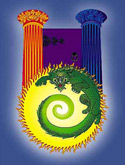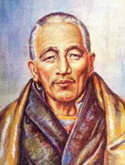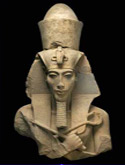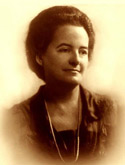Before entering into our specific subject I think it necessary to survey briefly the grave crisis through which humanity is passing at present and to consider its possible outcome. Every human problem is intimately bound up with other problems – one might even say, with all other problems, because of the essential and inevitable solidarity existing between men and groups of men, despite their denying it and attempting to violate it, owing to their selfishness which blinds them and makes them callous towards their fellow beings.
In fact, a problem which seems to be insoluble can often be solved once it is placed within the framework of a vaster and more comprehensive one. Humanity constitutes a great organism, analogous to the human body; therefore no cell (an individual) and no organ (a community or a people) can be truly cured if one does not take adequate care of the entire organism (humanity). Thus we should at the outset make a “declaration of interdependence”, borrowing Professor Overstreet’s apt expression which forms the title of one of his best books.
In the course of its history mankind has experienced many collective crises, when an empire or a culture or an entire civilisation declined and disintegrated; but the present crisis has attained a unique amplitude, intensity and urgency. For the first time the crisis is not limited to a specific domain, either religious, political, social or cultural, nor to one people or even to one continent.
The present crisis is of planetary scope and it affects every aspect of human life, material and psychological, individual and collective. Its climax has been reached by the invention of the atom and hydrogen bombs. The present acute tension cannot continue indefinitely; therefore humanity is confronted by three possibilities:
- A third world war, with the consequent annihilation of a large part of humanity and the collapse of the present civilisation.
- The strengthening of reactionary and separative trends. The predominance of the various nationalism, of totalitarian regimes, of merely economical and technical ‘values’. This would initiate a period or era which could indeed be called “satanic”, and over which would always hang the menace of destructive wars.
- The victory of humanistic principles and spiritual values, – the development of mutual understanding, appreciation and cooperation between individuals, groups of various kinds, peoples and continents. This would inaugurate a new world civilisation and culture to which all people and groups would freely bring their contribution and which could well constitute the prophesied and long waited for “messianic era”.
This trend towards cooperation and synthesis is already manifesting in many ways in the midst of, and notwithstanding, the turbulent cross-currents which are agitating the stormy sea of humanity. In the political field there is the United Nations organisation which, in spite of its shortcomings and its weakness in material power, has done and is doing much more useful work than is generally known. It has probably contributed in averting, so far, a new world war. There are then the various movements towards the Federation of groups of nations and towards a World Government.
In the economic and social fields we find the International Bank, the European Pool for Coal and Steel, the International Labour Organisation, the Food and Agricultural Organisation and many others.
In the cultural field there is, first of all, UNESCO, and a variety of other endeavours and organisations fostering international exchanges of professors, students, publications and information.
In the religious field there are ecumenical trends within Christianity; inter-faith organisations such as the Council of Christians and Jews; several spiritual movements with universalis trends which have world diffusion; and in general an increasing reciprocal knowledge, mutual interest and appreciation between the religious people of the West and of the East.
This general picture will enable us better to understand and gauge the special position and specific tasks of the Jews at present and in the future.
The outstanding fact which confronts us is that we, as Jews, are threatened more gravely than the other people and individuals by the dangers of the present political situation. This is equally true concerning the Jews who live in the State of Israel as it is for those living elsewhere throughout the world. The State of Israel is surrounded by millions of hostile Arabs; moreover, the strategic position of Palestine is such that it could become, as it has repeatedly in the past, a battle field for powerful nations or groups of nations.
The Jews of the Diaspora, in the case of a new world conflict, would find themselves within opposing camps, and particularly the young would be in the tragic position of being enrolled in opposing armies and thus would fight against each other without knowing it. This fact should constitute a strong incentive to dedicate ourselves wholeheartedly to the cause of world peace. But the bitter experience of the last decades has – or should have – taught us that a true and lasting peace cannot be achieved by mere “pacifism”, by a mere “war against war”, by treaties and pacts between States, nor by a more or less extensive disarmament.
A solid peace requires, and would be the reward of, two great positive achievements: first, the control and the constructive utilisation of the innate combative drives existing in individuals and groups,*[1] second, a gradual establishment of super-national Federations to which the States would transfer some of their “sovereign rights” and thus prepare the condition for a true and effective World Government.
To cooperate in this great task, which could be considered as universalism applied to politics – the Jews are particularly qualified through their unique, and in a sense paradoxical, position among the nations. It has been said – and the late chief Rabbi of Rome, David Prato, reaffirmed it – that every Jew has three countries: the one where he was born, Jerusalem, and the world.
Such a position may create problems and difficulties, but is not in itself contradictory; instead, it constitutes an opportunity for constructive activities. This fact has been well demonstrated by François Bondy in his study, Le Judaisme et la catastrophe européenne (Esprit, Sept. 1, 1945, p. 500):
“In the normal modern society, belonging to two or several circles, the multiplicity of political, religious, cultural allegiances is not abnormal; it is even the rule. At present, it is just as absurd to formulate the antithesis ‘Jew or French’ as it would be to put a Frenchman before the alternative: good believer or good citizen. The plurality of ties in which the political, the religious, the national and the cultural fields do not fully coincide is the deepest characteristic of an open society, is one of the conditions of the freedom and of the development of a complete personality.”
Thus the Jews, if they so choose, can have the privilege of forming the nucleus of the “One Humanity”, to cooperate everywhere, and in various ways, in the development of a planetary organism of which the nations, the communities and groups of all kinds shall be the tissues and organs. A definite demonstration of the possibility and fruitfulness of such “pluralism” can be found in the cultural field – both in the past and in the present. Whenever Jews found themselves in contact with other peoples, a cultural interplay took place on various levels. This occurred at Alexandria where Philo attempted a synthesis of Judaism with new-platonic thought. But perhaps the outstanding example was Maimonides who, while being one hundred per cent a Jew, absorbs and integrates into his Judaism many important principles of the Arabic philosophy of his time.
In the Middle Ages, in spite of their confinement in the Ghettos, the Jewish groups in the various countries developed special characteristics due to their contact with, and influence of, other peoples. The most remarkable product of such interplay was the creation of a new and specific language, – Yiddish – an amalgamation of German and Hebrew.
After the enfranchisement and the “enlightement” the Jews developed in the various nations different cultural groups, each having definite and specific characteristics: the German Jews, the Polish Jews, Anglo-Jewry, the French Jews, the Italian Jews, etc., and at present the American Jews who have rapidly acquired numerical preponderance.
Such development and amalgamation of culturally and geographically distinct groups has gone so far that in many cases the Jews living in a country are more informed, and take a more active part in the cultural activities of that country than in those of Jews in other countries. In some cases one can even say that a certain form of “provincialism” has developed. Therefore it seems evident that on of the important tasks facing us is that of creating connecting links of mutual knowledge and exchanges between those various Jewish groups.
The re-settlement of Jews in Palestine, and especially the establishment of the State of Israel, are rapidly developing a new Jewish centre which constitutes at present mainly a seething melting-pot where heterogeneous groups of individuals from all parts of the world interact, clash, and are trying to cooperate. The is a field and opportunity for urgent action, both in order to foster the difficult synthesis within Israel, and the interplay and integration between Israelis and the various Jewish groups in other countries.
All this shows the great and special contribution which Jews can make – one might even say, are obliged to make – to the cultural world synthesis which is at present rapidly on the way.
Also in the social field the Jews find themselves quite in tune with the trends of the times. Those trends, as is well known, are in the direction of new forms of communal living, abolishment of class privileges, the sharing of natural resources and of the means of production. In order to avoid any possible misunderstanding, it is well to point out the sharp difference existing between the various kinds of new social experiments and realisations, even of a daring character, made in free democratic countries – such as the socialisation of various industries, and the State health service for everybody, inaugurated by the Labour Government in Great Britain and maintained I great part by the present Conservative Government – and the enforced Communism imposed by violence by some totalitarian States of regime.
The Jews can accept and cooperate with this evolution or change of the world’s social structure because the rules pertaining to social justice, contained in the Tora, and particularly the impassioned injunction of the prophets, urge them to proceed in that direction, and even to take the lead in that onward march. The fact that, in the Diaspora, they constitute everywhere – except in Israel – minority groups, gives them a special interest in the establishment of social justice. In Israel where, instead, they are the great majority, they have had and have the opportunity to make free social experiments, particularly that of the Kibbutzim which constitute very interesting “pilot-projects”, the experiences and results of which may be very valuable for the planning of a new social order in the world.
The field of religion presents a more complicated situation and a multiplicity of problems. Owing to the long history of Judaism, to the many and diverse environments in which it flourished, and to the latitude allowed by the Jewish religion to its faithful, we find represented and expressed in it almost all the outlooks which are possible in the religious life, in religious doctrines and in religious practice.
Thus we find in Judaism expressions of rationalism and even, to a certain extent, of agnosticism, side with mysticism and esoteric doctrines. We find supporters of a strictly literal acceptance and application of the Commandments, while others indicate and uphold the symbolic meanings of the Tora, arriving at surprising and sometime far-fetched interpretations. There has been and there is, a wide range of attitudes, from the most rigid conservative, through different shades of reconstruction and progressive conceptions, to bold and radical innovations. There are those who emphasise the transcendental aspect of God, and those who stress the immanence of Deity. In the recent times some prominent Jewish religious existentialists have also appeared.[2]
It is a difficult task to gauge the respective importance, validity and present possibilities of all those trends, and it would certainly not be possible to do it on this occasion; it is sufficient for our present purpose to point out that some of those aspects, which are among the more vital ones in Judaism, are quite I harmony with the general trend which can be observed at present both in other religions and in many non-denominational spiritual movements.
To the efforts towards religious synthesis Judaism can contribute its basic tenet of the One God, and the prophetic vision on Universalism. To the more specific interplay and blending between Eastern and Western philosophies and religions, Judaism can make constructive contributions owing to the fact that it contains in itself both Eastern and Western elements.
If we consider the religious thought of recent times, we find that its general direction is towards emphasis on God’s immanence in man and in the world, and towards the realisation of His Kingdom on Earth with the free and active cooperation of man. (There are some currents in the opposite direction, which are very vocal and having a certain vogue, especially among intellectuals, but they represent a minor trend.) Judaism finds itself in full accord with the principal current which maintains that the manifestation of God in the world is demonstrated by His Kabod (Glory) and by His Shekinah (Presence).
The Biblical statement that “man was made after the image and likeness of God Who breathed into him His living spirit” is confirmed by some advanced modern psychologists, chiefly by C.G.Jung, who discovered in the human being a central spiritual element which he has called “the Self”. The Jewish teaching that man has “three souls” is in full accord with the findings of modern psychology concerning the complexity of human nature. This recognition prevents the serious mistake to which on-sided immanentism can lead and has led, namely the deification of the human personality which in many cases has had fatal consequences.[3]
The deep dissatisfaction with and rebellion against present conditions and the consequent strong, passionate urge towards the building of a better world, of a new and more satisfying civilization and culture, can be considered a practically identical with the messianic hope, as it has been re-interpreted by modern Jews, and with active cooperation with God towards the establishment on earth of His Kingdom of Justice, Peace and Unity.
Present Tasks for the Future
The general survey which precedes, however sketchy it necessarily is, can suffice to offer a frame of reference for the tasks which confront the Jews, and particularly the Jewish youth, at present. They can be summed up in the injunction of a sage: “Take roots downwards and bear fruits upwards”.
I. The Ground
The soil into which the roots must penetrate cannot be other that the ultimate Reality, which is generally called God.
“The roots have a double function: that of entering into an intimate connection with the soil…and that of absorbing and assimilating its living substance…The means…consist basically in that conscious, active, reciprocal relationship which Buber has aptly called ‘dialogue’… There would be much to say on how to carry on the dialogue. It has a definite spiritual technique. I cannot dwell on it on this occasion, but I shall briefly mention that it includes not only the art of appropriate speaking but, even more, the subtle and difficult art of keeping silent, hushing all the voices clamouring within us, and of alert listening in complete openness.
“The first thing which we should realize about this dialogue is that ‘God is polyglot’. This phrase may seem obvious, but it has some interesting implications. It is difficult to doubt that God understands all ‘languages’ or ways of expression, and that He is willing to answer each man and each community in their own way. Yet there are still many who believe that their prayers are only acceptable if the are voiced in Hebrew or in Latin rather than in English! It is difficult to doubt that God does understand and appreciate all the way in which He is addressed – the way of submission and that of praise, the way of love and that of a freely offered cooperation; in fact, all forms of genuine relationship.
We believe too that He is broadminded enough to accept the dialogue also with those who do not call Him God – that He does not object to being called the Absolute – Ultimate Reality – the Supreme Self – the Mystery – the Other – the Unconditioned. Indeed, something in Him does correspond to all these ’Names’, although not to any one of them exclusively.
“It is good to realize the variety, the richness, the fruitfulness of the many possible relationships between God and man. He can be , and is for man the King or Ruler; the Lawgiver; the Teacher; the Saviour; the Partner; the Friend; the Lover; the Father.
“He has been at various times all of these to the various prophets. He can be the same to us now, individually and collectively. In our dialogue with Him we can use any of the corresponding ‘languages’ – as subjects or as pupils; as co-workers or as sons. But, owing to the increased psychological knowledge, broadmindedness and pliability which can be ours, we should endeavour to play various of these roles and even all of them; to address God in every possible ‘language’, to shoot into the limitless ground on ever increasing number of rootlets.
“Thus, and only thus, can the relationship become whole, namely between all the manifold aspects of each human being and of each community and an ever increasing number of the countless spiritual potentialities existing in the Supreme. Thus the relationship can have an ever increasing richness and fruitfulness, the sap be ever more abundant and nourishing”.[4]
Beside this direct and immediate connection with the soil, there is also that which can be achieved indirectly through the meditation and help of various channels or links. These are mainly four: 1) the Tora; 2) the Tradition; 3) Modern teachers”; 4) Communal worship.
a. The Torah
Without discussing the moot question of the verbal inspiration of the sacred writings, it is enough for the present purpose to remind ourselves that even orthodox teachers have declared that it is not only permissible, but even necessary constantly to re-interpret those texts. Here is what Rabbi Leo Jung declares in unmistakable terms:
“In Judaism, interpretation is not only a privilege but a duty. Interpretation, consistent with the basic principle of revelation, have ever been a characteristic of Judaism. Through interpretation and re-interpretation, progressive revelation of the will of God and His guidance of man has been maintained. Where Jewish practice (halachah) is not undermined, interpretation is religious duty. Indeed, the richness and inwardness of Judaism is due to the fact that generous use has been made of this privilege and duty.
Not only we find God, but the fact of reaching Him is essential. Hence Judaism has taught and Jewish scholars, thinkers and dreamers have practised a rare liberalism in interpretation. The perennial freshness, to the normal Jew, o the Tora is due to the fact that every generation with its own new interpretation pours its mental and emotional strength into the texts of our faith“.
Hence Judaism knows no literalism or fundamentalism.
“The text of the Bible has been subjected to ever new interpretations, and each new interpretation has been hailed as the fruit of faith, and welcomed as an additional source of mental and spiritual enrichment. This principle of freedom of interpretation is not a child of our liberal age, but has been acted upon for the last two millennia by rabbi and learned layman alike”.[5]
b. The Tradition
This may be considered a general way as the result of the re-interpretations by the Jewish teachers throughout the centuries, of the illumination received by them through their communion with God and of the oral transmission of both – illuminations and interpretations – from teacher to disciple. An important part of this tradition is constituted by the kabala, which has been much discussed, and rightly so, because it forms an heterogeneous mixture of very high teaching with many far-fetched and unwarranted accretions.
On the present occasion I shall only mention that a prominent Jewish teacher of the last century, Elio Benamozegh, who is quite modern and perhaps even prophetic in some respects, incorporated in his great work, Israel et l’Humanite, many of the best aspects of the Kabala. Particularly the chapter “L’Idee de l’homme dans l’Hebraisme: notion Juive du Progrès” is quite in agreement with, and offers a strong support to, the spirit animating the World Union for Progressive Judaism.
c. Modern Teachers
These are well known to you, for most of them have been the inspirers, founders and implementers of the World Union. Among theses are: Claude Montefiore, Lilly H. Mantague, Leo Back and Israel Mattuck. There are other modern teachers and interpreters of Judaism who, with certain definite qualifications, can be considered to have given a living message. They are chiefly: Martin Buber and Mordechai Kaplan, but of course it is not enough to know and admire the teachers; it is necessary to study, assimilate and put into practice their messages.
d. Communal Worship
The various progressive movements in Judaism (reform, liberal and “reconstructionist”) have made creative attempts to bring the old rites in the synagogue and in the family into tune with the mentality of modern man and the conditions of the modern world. Much of this has proved satisfactory, but there is still ample scope for development and renewal.
II. The Trunk – The Preparation
In order to bear fruits, the tree must develop from the roots a strong and healthy trunk. This corresponds to an adequate preparation of those who intend to produce the fruits; i.e. , to accomplish the creative activities needed to achieve the high purpose which has been outlined.
We may say that these few days which we are spending together here are a good example of, and even, I hope, a real contribution to such work of preparation an important part of this consist in creating a living synthesis among the Jews throughout the world, particularly among its three main centres: the Israelis, the American Jews and the European Jews. The most direct way to achieve it is through personal contacts with groups and individuals. Most of the work of the World Union has been rightly aimed at creating such opportunities through its eight international Conferences. At the seventh its Youth Section was created which, as you know, has already held two camps of its own.
Another useful, even more, necessary means of preparation is that of reading on contemporary events and problems. There is indeed no dearth of such reading material; there is rather an “embarrass de richesses”. The problem is that of choosing with discrimination among the welter of books and periodicals those which are the best and the more useful within the limits of one’s time and possibilities. The following are just a few indications, by no means exclusive, and chiefly within the field of Progressive Judaism:
First of all I would recommend a careful perusal of the Reports of the last three Conferences of the World Union for Progressive Judaism, dedicated respectively to: The Mission of Judaism, its Present Day Application; The present contribution of Judaism to Civilisation, our Religious Approach to World Problems. The the various periodicals of the progressive movement:
“The Newsletter” (of the World Union); “Liberal Judaism” (London); “American Judaism” (New York); “The Progressive Jew” (Johannesburg); “Le Rayon” (Paris); the “Bolletine della Unione Italiana” (Florence); and the magazine of the Youth Section. Among the many other periodicals, I shall mention only two: “The Reconstructionist” which, although belonging to a special movement, contains interesting material and discussions of present-day problems along liberal lines, and “Commentary” which is an independent and high-class magazine in which current questions are examined from various points of view.
III. The Fruits
The spiritual sap rising from the roots through the trunk, and the nourishment absorbed from the air and the sun through the “leaves” can and will give fruitful results, if individuals and groups will give them expression by planned, wise and effective action.
The following indications are meant to be chiefly suggestive and as starting-points for group consideration and for an exchange of ideas, at the present meeting and on other occasions.
Political and social fields
In these fields, as well as in the religious one, the best motives and highest ideas, if not balanced by discrimination, wisdom, and inclusive outlook and long-range view, are unfortunately apt to engender fanaticism, intolerance and the use of ruthless methods. May I, who have such a great appreciation of youth and consider it the hope of the future – be allowed to say that this is danger to which the young, just on account of their enthusiasm, are more apt to succumb – although, also in this field, many of the older generation have given rather bad examples! Therefore it should be emphasized that there is no need for uniformity, nor to adhere to any specific political party. However, there are definite trends which can be demonstrated to be really constructive and leading out of the present impasse toward a better future.
In order to develop a program based on those trends and to put it into action, it is necessary first of all not to succumb to the lure and glamour of either nationalism or political totalitarianism, both of which enforce conformity, crush the freedom of the individual and of minorities and are thus the negation of true democracy and of the essential human and spiritual values.
On the positive side, that task requires widespread and intensive action in all the fields mentioned earlier. A considerable amount of work in this respect has already been started. The World Union has taken an active part a a “non-governmental body with consultative status” both in the United Nations Organisation and in the UNESCO.
Reports about this work, by Mr Ronalds and Rabbi Zaoui respectively can be found in the Report of the 1953 Conference (pp.93-103). Of particular interest and value for the Jews is the proposal made by Rabbi Zaoui, on behalf of the World Union, to arrive at an international arrangement with UNESCO which would ensure closer cooperation on issues of religious interest. This proposal has met with an encouraging response from the Director-General of UNESCO.
A wide program of social action has been proposed at the 1953 Conference by Dr.Isserman, under the title: “Charter for the Commission on social Action and International Relations”. Given at the same Conference, offered deep insights into the meaning given to it by Judaism, and into the challenge with which it confronts us. In that address he declares:
“To Judaism Justice meant – and more that ever is now called to mean – the religious dynamics of life, that is, a steady moving force, a moral power that never rests, but always on the way. It is, as the prophet has it, “a mighty stream”. Ever afresh, justice is to be realized and actualized. This must be stressed because two dangers so frequently threaten the process of justice: the one is the self satisfaction which, however honestly, thinks that justice is rather a method that a final aim; that right statures and rules are but to be applied in order to have justice done.
Justice is not a fixed course, but a continual regeneration, with every new condition it must be reborn. The other danger is silencing or calming true justice by charitable works. It scarcely needs saying that charity is one of the greatest calls of life. But as frequently has it helped to appease the sense of justice; one showed loving kindness to the injured and to the slaves, and thought so to be exempted from actualizing justice”.
The specific applications of these general principles to the very diverse conditions existing in the various countries of the world would be correspondingly different. The situation in Israel presents unique and very difficult problems. It is not possible to enumerate them on this occasion. I shall venture only to offer a suggestion of our Israeli friends.
The more we are baffled by complexities and apparent contradictions, the more we are engaged in the thick of the battle, the more it behooves us to keep well in mind, and to let ourselves be led by, the sure ad lasting spiritual principles which rule – or should rule – human life. For this purpose, as well as for practical reasons, it seems that an harmonious cooperation and integration between Israelis and the Jews of other countries would be very valuable and fruitful.
In the cultural field we find again the fundamental task and problems of the interplay between the various cultural fields in the different countries and the Jewish minorities living in them, while in Israel the problem is that of the cultural amalgamation among the groups which have come from those countries.
According to the Jewish conception of unity and of the consequent close interdependence of all aspects and activities of human life, a truly Jewish creative activity in literature, in music and in the various other arts (including the cinema which should be on the artistic level) should not be divorced from, and even less antagonistic to, the basic spiritual principles. This should involve to limitation of the artist’s freedom of expression; it implies only his recognition of a higher source of inspiration, of a wider and more truly human significance and purpose of his creative activity.
The field of science is by its own nature objective and universal, and it should have no group connotations and limitations. Therefore we can say that there are no specific Jewish problems in the natural sciences; there are only the practical problems of technical application in Israel.
If we include in the field of science, in its larger connotation, also the humanistic sciences, such as history and sociology, there are then some problems directly concerning ourselves as Jews. On one side there is the necessity to eliminate from the textbooks of history all the bias and anti-Semitic distortions of facts and valuations (in this respect UNESCO is already doing excellent work); on the other hand, in our own textbooks of historical and sociological character we should beware of any undue exaltation or our own achievements and also eliminate all manifestations of a persecution complex which our history may have developed in our collective unconscious.
But there is one science which has a particular position and to which Jews have a special relationship – it is the science of psychology. The psychological complexities and contradictions which are found in the make-up of Jews, due to their peculiar history and position and particularly to their cultural pluralism, have created in them a special interest in, and a great need for, psychological insight and help. Its is significant in this respect that two great pioneers and leaders in the field of modern psychology, in its applications to human needs, have bee Sigmund Freud and Alfred Adler.
At present there is a definite trend in psychology to appreciate and to include the spiritual elements of human nature and to integrate all its aspects into a synthetic conception of the personality. To this new spiritual psychology Jews can make valuable contributions. Some have already been made by Liebman, Fromm, Baruk, and others.
Through the theory and practice of psychosynthesis I have been working along this line. My main endeavour has been to give scientific proof of the existence and of the activity of the spiritual soul (the neshama), within the psyche (ruach), as an inspiring and unifying factor. The principle and methods of psychosynthesis are being applied to individuals both in the form of treatment of nervous and psychological troubles and as a method of education toward wholeness. Its inter-individual applications reach from the problems of harmonious relations in marriage, and between parents and children to the synthesis of, and between all kinds of groups, up to nations and, finally, to the psychosynthesis of the whole humanity, which can be considered as the humanistic application and expression of universalism.
May I repeat once more that the Jews, through their peculiar destiny and position, have a unique opportunity to contribute to these successive and ever wider integrations, which are the necessary steps towards the true Shalom which will make possible the coming of the Kingdom of God on Earth.
The following inspiring statements made by two great leaders of Progressive Judaism: Claude Montefiore and Leo Baeck, seem to me to be the most apt conclusion of this talk:
“(Jewry) has a threefold mission – to itself, to the world, and to God,”[6]
“we must have great thoughts; we must begin to think highly, nobly, magnanimously. All depends on great ideas… New days wait for us; they expect us. Our God waits for us.”[7]
(Address given at the International Camp. Youth Section, World Union for Progressive Judaism. Boulogne s/Seine, July 1953.)
[1] This subject has been extensively dealt with in a paper on the Transmutation and Sublimation of the Combative Energies.
[2] See Will Herberg, Judaism and Modern Man. The Jewish Publication Society of America, Philadelphia, 1951.
[3] The opposite; i.e. the existentialistic current to which we referred may be considered as a somewhat justified by extreme reaction against the illusion of self-deification. The difference between “God-likeness” and the deification of the human personality has been very ably expounded by Mordechai Kaplan in his book, The Future of the American Jew. Mcmillan, New York, 1948.
[4] Roberto Assagioli, in the Report of the Seventh World Union Conference, 1951, pp.82-83).
[5] Judaism in a Changing World, by Rabbi Leo Jung, Oxford University Press, New York, 1939, pp 4-5.
[6] Claude Montefiore, Origin and Growth of Religion, p 285.
[7] Leo Baeck, The Mission of Judaism, World Union Conferences, 1949, pp 75-76.














